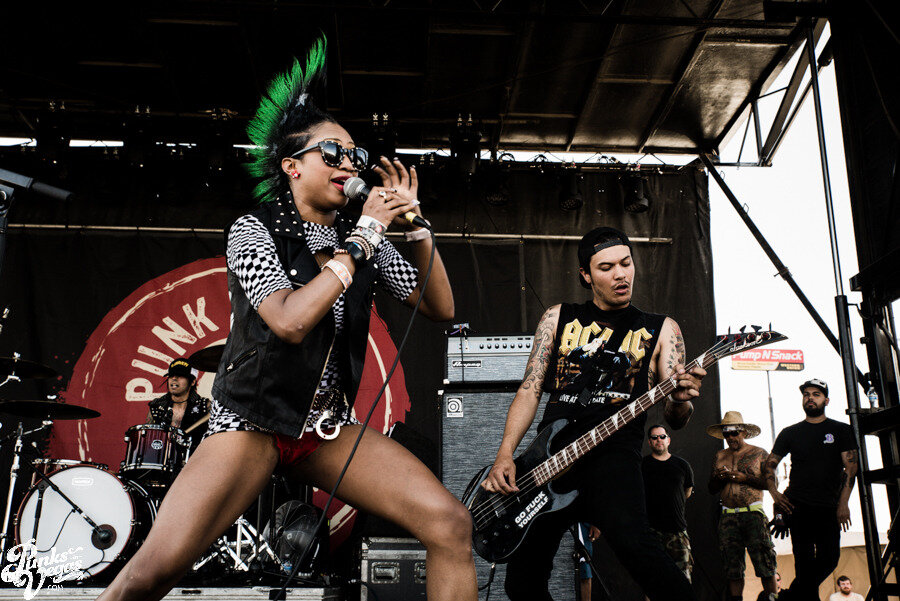A Short History of Punk Rock
There was a restless feeling on the fringes of the music scene that rock music was becoming too tame in the late 60s and early 70s. Particularly in North America, Australia and the U.K., counter-cultural communities were fed up with the shiny and presentable popular artists of the day: The Beatles, Billy Joel and the Rolling Stones topped the charts, and the flowery psychedelic rock of the slowly disintegrating hippie culture still held on. People felt the need for something new, a genre that screamed about injustice instead of dancing around it. In their song “Hate & War”, The Clash flipped the classic hippie motto “peace and love” upside down with the lyric “Hate and war/The only things we got today.”
Defining characteristics of punk songs include brevity, simplicity, occasionally crude lyrics and political criticism. Many punk bands also distance themselves from record labels and release music independently, in order to maintain the radical authenticity that the genre glorifies. Songs typically use their time efficiently, which means no indulgent guitar solos or particularly complex musicology is often used. One famous poster from the beginnings of punk rock reads “This is a chord. This is another. This is a third. Now form a band.” And many pioneers of punk did just that.
One of the main elements that separates punk music from other genres is controversial and hostile lyrics-- often used to criticise leaders, ideologies and governmental systems. Many times, these lyrics remain relevant years after they were written, and punk anthems live on to inspire generation after generation.
“Because you're old and rich/You don't care about this earth/Only about your filthy profits/Poisoned Planet nuclear war/It's not your problem anymore” shouted Corrosion of Conformity in their song “Poison Planet”.
They wrote this verse in 1984, but it perfectly echoes modern concerns about global warming and the huge amount of environmental damage being done by large corporations.
“I don't need to be a global citizen/Because I'm blessed by nationality/I'm a member of a growing populace/We enforce our popularity” sang Bad Religion in “American Jesus”.
This song, written in 1993, was a response to American ethnocentrism and radical nationalism during the Bush administration. These ideals have recently had another boost in popularity with the rise of the Trump administration, making these lyrics strongly resonate with people who oppose radical nationalism yet again.
“Stop calling it ‘alt-Right’/Punch a Nazi, win the fight/Stop saying it's alright/Punch a Nazi, your bark's got no bite” belted Doll Skin in “Puncha Nazi”.
In this more recent example from 2017, Doll Skin does not attempt downplay or soften their opinions giving this song a distinctly punk edge.
Punk music originated in part to give marginalized voices and unpopular opinions a stage. This is because it emerged as a countercultural movement; it was a safe place for people who felt failed by society. Despite this, punk bands noticeably lacked people of color when the genre was on the rise. Bringing attention to social and economic issues is also a large part of punk subculture, which is why it is especially important to have racial diversity. To the untrained eye, it may appear that the punk scene in the modern day is dead. This could not be less true. Punk music is thriving in new places and with a new purpose. Punk ideology is more alive than ever, particularly in Gen Z, and POC-led punk bands that are finally getting more recognition.
Suggestions
Pleasure Venom is a fantastic punk band from Austin, Texas. Many of their songs contain heavily political messages, including the song “Deth”, which was inspired by the death of Tamir Rice. Favorite songs: “Deth”, “Seize”
The Txlips Band are another groundbreaking punk band that deserve endless recognition. Currently, all money made from streams is being donated to organizations affiliated with Black Lives Matter. Favorite songs: “Die Today”, “The Lost One”



